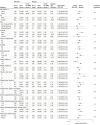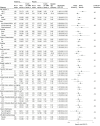Effect of Marine Omega-3 Fatty Acid and Vitamin D Supplementation on Incident Atrial Fibrillation: A Randomized Clinical Trial
- PMID: 33724323
- PMCID: PMC7967086
- DOI: 10.1001/jama.2021.1489
Effect of Marine Omega-3 Fatty Acid and Vitamin D Supplementation on Incident Atrial Fibrillation: A Randomized Clinical Trial
Abstract
Importance: Atrial fibrillation (AF) is the most common heart rhythm disturbance, continues to increase in incidence, and results in significant morbidity and mortality. The marine omega-3 fatty acids, eicosapentaenoic acid (EPA) and docosahexaenoic acid (DHA), and vitamin D have been reported to have both benefits and risks with respect to incident AF, but large-scale, long-term randomized trial data are lacking.
Objective: To test the effects of long-term administration of marine omega-3 fatty acids and vitamin D on incident AF.
Design, setting, and participants: An ancillary study of a 2 × 2 factorial randomized clinical trial involving 25 119 women and men aged 50 years or older without prior cardiovascular disease, cancer, or AF. Participants were recruited directly by mail between November 2011 and March 2014 from all 50 US states and were followed up until December 31, 2017.
Interventions: Participants were randomized to receive EPA-DHA (460 mg/d of EPA and 380 mg/d of DHA) and vitamin D3 (2000 IU/d) (n = 6272 analyzed); EPA-DHA and placebo (n = 6270 analyzed); vitamin D3 and placebo (n = 6281 analyzed); or 2 placebos (n = 6296 analyzed).
Main outcomes and measures: The primary outcome was incident AF confirmed by medical record review.
Results: Among the 25 119 participants who were randomized and included in the analysis (mean age, 66.7 years; 50.8% women), 24 127 (96.1%) completed the trial. Over a median 5.3 years of treatment and follow-up, the primary end point of incident AF occurred in 900 participants (3.6% of study population). For the EPA-DHA vs placebo comparison, incident AF events occurred in 469 (3.7%) vs 431 (3.4%) participants, respectively (hazard ratio, 1.09; 95% CI, 0.96-1.24; P = .19). For the vitamin D3 vs placebo comparison, incident AF events occurred in 469 (3.7%) vs 431 (3.4%) participants, respectively (hazard ratio, 1.09; 95% CI, 0.96-1.25; P = .19). There was no evidence for interaction between the 2 study agents (P = .39).
Conclusions and relevance: Among adults aged 50 years or older, treatment with EPA-DHA or vitamin D3, compared with placebo, resulted in no significant difference in the risk of incident AF over a median follow-up of more than 5 years. The findings do not support the use of either agent for the primary prevention of incident AF.
Trial registration: ClinicalTrials.gov Identifiers: NCT02178410; NCT01169259.
Conflict of interest statement
Figures




Comment in
-
Omega-3 Fatty Acids and Atrial Fibrillation.JAMA. 2021 Mar 16;325(11):1063. doi: 10.1001/jama.2021.2909. JAMA. 2021. PMID: 33724309 No abstract available.
References
Publication types
MeSH terms
Substances
Associated data
Grants and funding
LinkOut - more resources
Full Text Sources
Other Literature Sources
Medical
Research Materials

